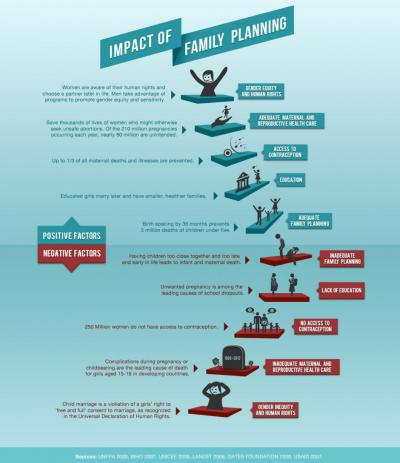MAMA TO BE?
The idea of motherhood starts with the most intimate of questions.
- Can I decide when to become sexually active and choose my partner?
- Am I aware of birth control and the role it can play?
- Is birth control available if I need it?
- Do I have the power to make one of life’s most momentous commitments - whether, with whom, and when, to have children?
According to the United Nations, all women should have the right to make informed choices about childbearing and have access to reproductive health services, free from violence and coercion.1 Yet in too many places, that right to control one’s body and destiny is not recognized.
The vast majority of the world’s prospective moms are young, poor and living in Africa, Asia and Latin America. Over 200 million of them want to delay or stop childbearing, but are not using family planning, because they can’t get it, or their families object.2
Pregnancy is the leading cause of death for teenage girls under 19 in the developing world and a significant risk for older women, too.3 Family planning saves lives by enabling women to delay motherhood, space births and avoid unsafe abortions, which cause nearly 67,000 deaths each year.
Outside the developing world, women’s ability to plan their families is also not fully secure – and issues about the delay of motherhood and the use of technology have joined the traditional dilemmas about becoming a mother. In many industrialized countries, women’s private decisions about motherhood have become hot social issues: home birth vs. hospital delivery, the right to maternity leave, combining motherhood with a career, delaying motherhood until late in life and the use of and cost of infertility treatments.
While the battle for women’s reproductive rights has yet to be won worldwide, there’s remarkably good news for disadvantaged girls in poor nations – if they get early access to education. Research shows educated girls are delaying marriage and having fewer children.4 They are more likely to send them to school and will increase their own earning power. Girls’ education is “the single best investment any society can make.” says UNICEF.5
In the Mama to Be? gallery:
- LISTEN to Mamas Voices, and hear what women all over the world have to say about the big question: "To be or not to be a mother?"
- CONSIDER Kavita Ramdas' Big Idea about how reproductive choice is about more than just human rights
- ENGAGE WITH Miriam Schaer's artwork and personal essay expressing her experience of not choosing motherhood
- AND MUCH MORE >
1The Right to Reproductive and Sexual Health, United Nations, accessed on 7 November 2011
2Contraceptives Save Lives, UNFPA Fact Sheet, Accessed 19 November 2011
3Family Planning Overview, Gates Foundation, Accessed 19 November 2011
4Girls’ Education, World Bank, Accessed 19 November 2011
5On the Launch of the Girls’ Education Movement, Speech by Carol Bellamy, UNICEF


